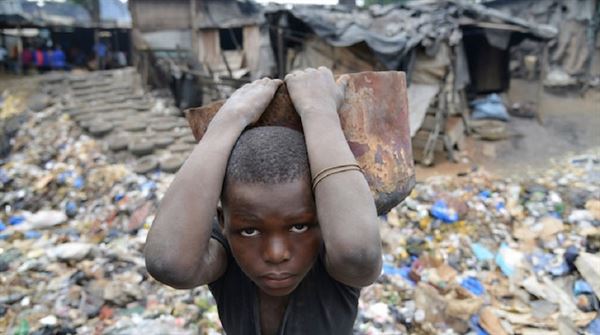Diagnosed with human immunodeficiency virus (HIV) or AIDS and reeling under extreme poverty, hundreds of children in Epworth -- a slum settlement, 25-
Diagnosed with human immunodeficiency virus (HIV) or AIDS and reeling under extreme poverty, hundreds of children in Epworth — a slum settlement, 25-kilometer (15.5 miles) east of Harare, the Zimbabwean capital — remain abandoned by the society.
As the world commemorates AIDS Day on Sunday, Elizabeth Chinamhora, 15, and Takunda Mapuranga, 17, who are fighting AIDS, poverty and isolation, are awaiting a helping hand from communities, to attend to their ostracization. The theme of 2019 World AIDS Day is “Communities make the difference”.
“My parents died of AIDS in 2017 and 2018. I do not have any means to treat myself or my six siblings. My day begins early to find odd jobs, to feed my family” Elizabeth told Anadolu Agency.
The story is same for Takunda, who lives nearby, shouldering responsibility of four siblings. All of them had do dropout from schools after testing HIV positive and then death of their parents.
“I have to make sure that I get odd jobs, in return for cash or food, so that we can survive. I also have to collect treatment drugs for all of my siblings, from a local healthcare center,” Takunda told Anadolu Agency.
According to the UNICEF, of the 6.3 million children in Zimbabwe, 76,600 children are suffering from AIDS. A double whammy is that most of them live under abject poverty.
According to Zimbabwe National Statistics Agency (ZIMSTAT), the country houses 430,000 households, where children are breadwinners. Out of them 70% are affected by the HIV.
“Owing to poverty and AIDS, children are dropping out from schools. We see them on roadsides, begging for money and food,” said Charlene Chekenya, director for Stand Foundation Trust, a women and girls’ rights organization in Zimbabwe.
“Orphaned and abandoned children, who struggle to make both ends meet are prone to social, educational, psychological, and cognitive development problems,” Taylor Nyanhete, director of the Zimbabwe National Council for the Welfare of Children (ZNCWC), told Anadolu Agency.
Zimbabwe has one of the highest HIV and AIDS prevalence in the sub-Saharan Africa. According to an estimate a staggering 1.3 million people, comprising 12.7% of total population, are living with HIV as of last year, according to the UNAIDS.
Jabulani Xaba, who heads the Khayelitsha Children’s Home, an orphanage in Bulawayo in the Zimbabwe’s second largest city, said the country has high mortality rates because of HIV positive cases.
Extreme poverty and lack of resources makes AIDS orphans like Takunda, to await a slow death, in the country where inflation has grown to 300%.
“People tell us that we will soon die of AIDS. Maybe they are right. We are awaiting the final call. But till then have to strive to feed myself and my siblings,” he said.
Since the 2019 World AIDS Day, stresses on the role of communities to fight the deadly disease, experts believe a strong advocacy is needed to ensure that human rights are respected and also decision-makers and implementers are held accountable.
